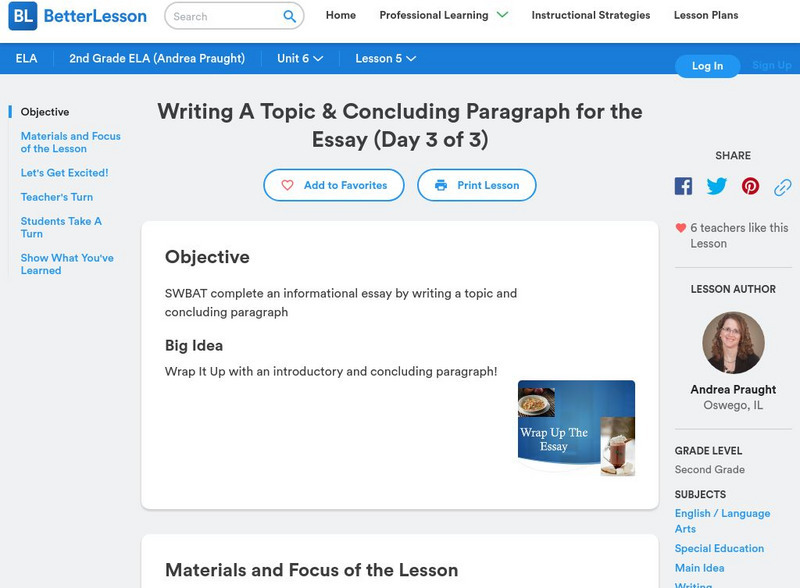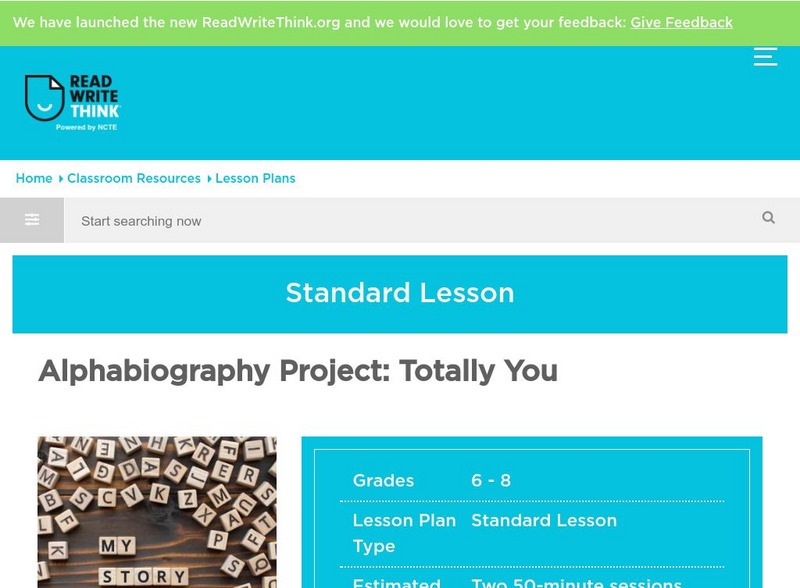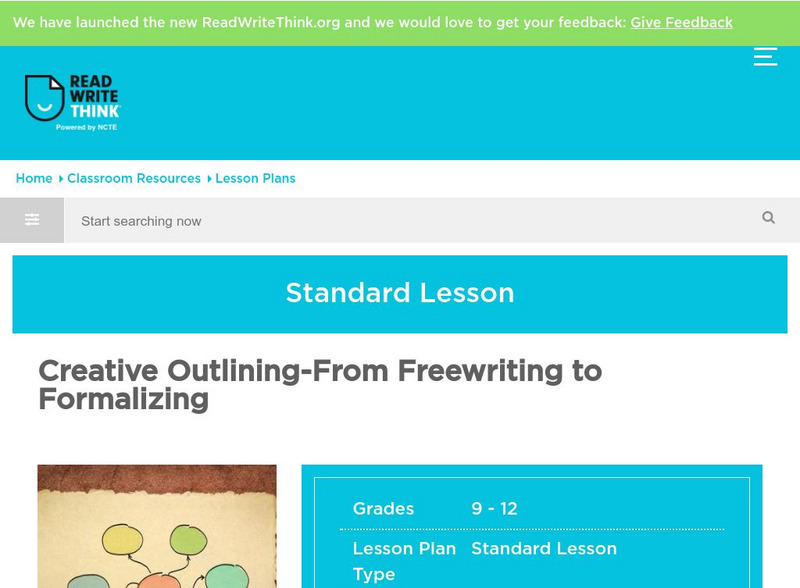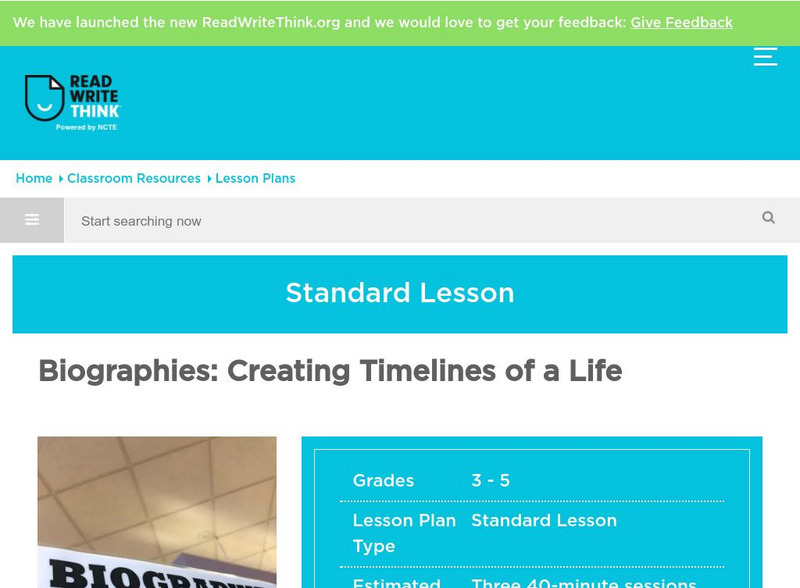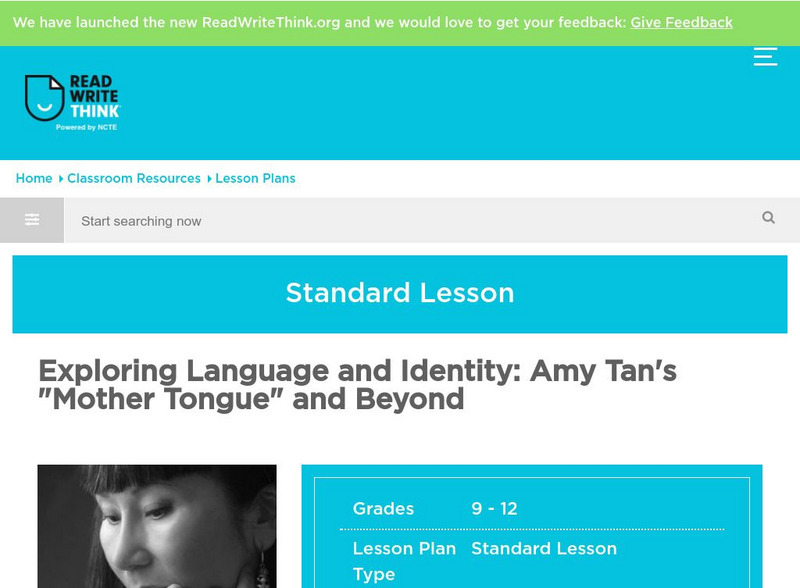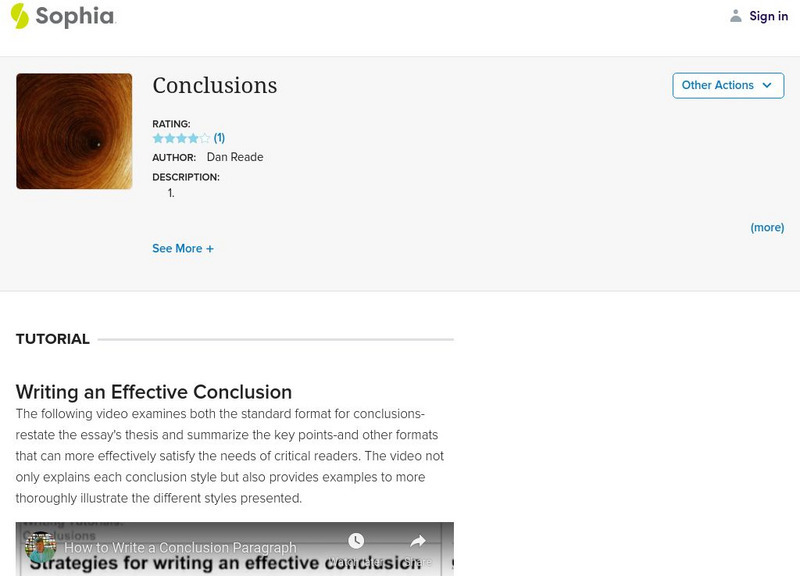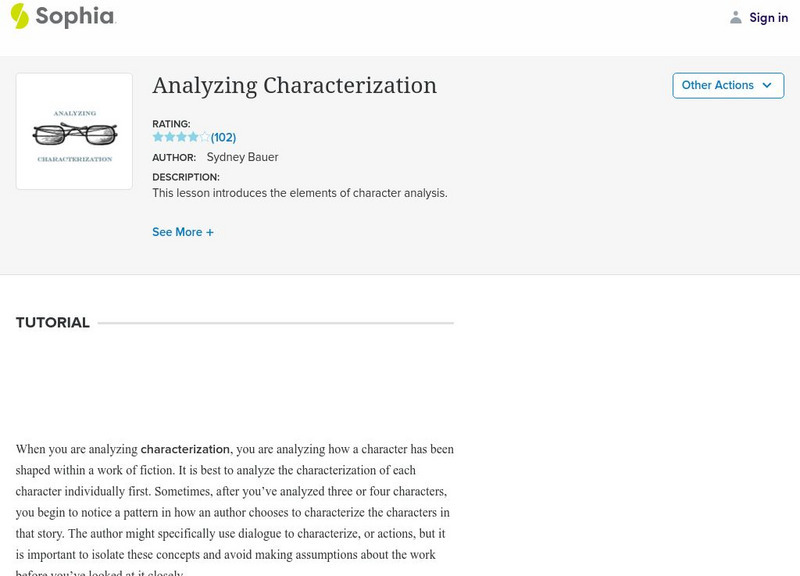Better Lesson
Better Lesson: Writing a Topic & Concluding Paragraph for the Essay
This lesson is a final step towards supporting young scholars to practice writing an informative/explanatory paragraph conveying complex ideas and presenting information clearly and accurately. Second-grade students can usually write a...
ReadWriteThink
Read Write Think: Alphabiography Project Totally You
Contains plans for two lessons that ask learners to write autobiographies using aspects of their lives for each letter of the alphabet. In addition to objectives and standards, this instructional plan contains links to sites used in the...
ReadWriteThink
Read Write Think: Examining Plot Conflict Through a Comparison/contrast Essay
Contains plans for six lessons that ask students to examine types of conflict (character vs. character, character vs. self, character vs. nature, and character vs. society) before writing essays that compare and contrast two conflicts....
ReadWriteThink
Read Write Think: Comparing and Contrasting: Picturing an Organizational Pattern
Contains plans for two 50-minute lessons that teach about the comparison/contrast organizational pattern. In addition to objectives and standards, this instructional plan contains links to PDF handouts and sites used in the lessons as...
ReadWriteThink
Read Write Think: Teaching the Compare and Contrast Essay Through Modeling
Contains plans for three lessons that teach students how to write comparison contrast essays after modeling the form to them. In addition to objectives and standards, this instructional plan contains links to sites used in the lessons as...
ReadWriteThink
Read Write Think: Creative Outlining?from Freewriting to Formalizing
Contains plans for five 50-minute lessons that ask students to write literary analysis essays about Edgar Allen Poe's ?The Fall of the House of Usher.? In addition to objectives and standards, this instructional plan contains links to...
ReadWriteThink
Read Write Think: Identifying and Writing Effective Opening "Hooks"
Contains plans for four lessons that teach students to write effective "hooks," or beginnings, to their writing. They read the introductions of fiction passages and analyze the techniques they use before applying these techniques in...
ReadWriteThink
Read Write Think: Biographies: Creating Timelines of Life
Online lesson which allows students to choose a person of interest and create a timeline of their life. Includes working together, researching potential conflicting information, and developing essays from the original research.
ReadWriteThink
Read Write Think: Amy Tan's
Contains plans for five lessons that use Amy Tan's essay "Mother Tongue" to teach about nonfiction and fiction as well as engage the issue of language and identity. In addition to objectives and standards, this instructional plan...
Sophia Learning
Sophia: Conclusions
A screencast lesson defining a conclusion and discussing how to write an effective conclusion. Students learn the traditional conclusion format as well as other formats that may better fit a writer's topic and purpose. Includes a section...
University of Sydney (Australia)
The Write Site: Practice: Constructing a Working Thesis
In this interactive lesson, students will refer to a synthesis grid to determine the "best" thesis to use when answering a business management question.
Peace Corps
Peace Corps: Narrative Cartoons
Using the communicative means of cartooning, young scholars examine essays from various Peace Corps volunteers and recount them by writing their own cartoons.
Lumen Learning
Lumen: Critical Reading: Logic and Structure
This lesson focuses on structure and logic including types and purposes of essays, organizational patterns, argumentative writing, and logic and fallacies.
John F. Kennedy Center
The Kennedy Center: Multi Media Hero Analysis
Using what they learn about how heroes are depicted in art, literature, and music, young scholars create their own definition of a hero, and then write an essay based on a hero they wish to research.
Alabama Learning Exchange
Alex: Biodiversity: Local Ecosystem & Food Web
This is a hands on lesson plan in which students will explore their local community to identify living things. It can be used as part of a unit on biodiversity and energy transfer within a biology, zoology, or environmental science...
Sophia Learning
Sophia: Compare and Contrast Papers
This lesson introduces comparison/contrast papers.
Sophia Learning
Sophia: Analyzing Characterization
This lesson introduces the elements of character analysis and uses Poe's "Tell Tale Heart" for an example. RL.9-10.3 Analyzing Characters
PBS
Pbs: American Masters: F. Scott Fitzgerald
An essay by F. Scott Fitzgerald with autobiographical elements, called 'The Crack Up', can be read here. There is also an interactive timeline of Fitzgerald's life, and an interview with filmmaker DeWitt Sage, who worked on a film about...
University of California
History Project: The Homestead Strike of 1892
This high school lesson focuses on the Homestead Strike of 1892. Students are asked to write an essay explaining why the strike occurred and how the Carnegie Company went about winning the strike. Included are twenty-seven primary source...
National Endowment for the Humanities
Neh: Edsit Ement: Animal Farm: Allegory and the Art of Persuasion
This lesson plan will introduce learners to the concept of allegory by using George Orwell's widely read novella, Animal Farm. Through this novel, students will learn what an allegory is, the rhetorical components of an allegory, and...
University of California
History Project: Bacon's Rebellion
Students will write an essay on the history of Bacon's Rebellion based on the analysis of sixteen primary source documents.
University of California
History Project: The Path to Watergate
Students will write an essay on the causes of the Watergate affair using background information, a chronology of events, and nineteen primary source documents.
Smithsonian Institution
National Museum of Natural History: Does Our Background Shape Our Thinking About Environmental Issues? [Pdf]
A lesson plan where students explore the positive and negative impacts of human activities on the environment today and in the distant past, and examine how attitudes towards the environment might be shaped by one's experiences growing...
